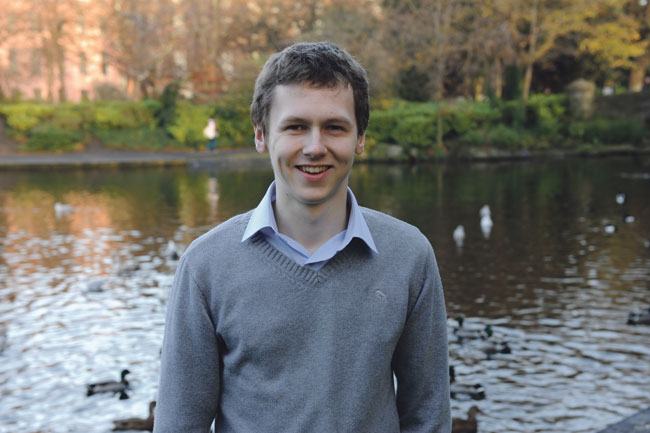
Leading Irish social entrepreneur Adam Harris is working on an autism-friendly campus pilot project, making the leap “from a lovely garage project run by a cute teenager” to Ireland’s one-stop shop for an autism-friendly society.
Three years ago, Adam Harris was in first year of a social studies degree in UCD. Today, he is far from lecture halls, as an award-winning social entrepreneur and founder of AsIAm, an organisation with what Harris describes to The University Times as a “very simple mission statement”. That is: “Every person with autism should have the opportunity to reach their own potential and fully participate in society as they are.” This is achieved through self-advocacy training, workshops for an autism-friendly workplace and school.
It is interesting to trace Harris’s path from college to entrepreneurship. Following an appearance on The Late Late Show, Harris recalls the huge surge of interest that resulted in AsIAm, which also made it increasingly difficult to balance college and work: “It came to a head in December when I had to make a decision between going to a conference in Turkey to secure funding or doing my first year exams.”
But how does an idea, like AsIAm, transfigure into a successful reality? According to Harris, AsIAm’s emphasis on people and ideas as opposed to systems and output has been key to the organisation’s growth. He explains: “I travel three to four days a week around the country and abroad to physically meet as many people as possible… We have shown respect to people around the country by making our time available and that I think has earned a lot of respect for our organisation.”
The awarding of a 12-month mentorship programme by Social Entrepreneurs Ireland came at crucial time for Harris, helping him to run his organisation “like a business”. He particularly cites the help that he received towards managing expectations: “Everyone wants you to change the world … but you actually have to learn to become very focused … and put the blinkers on.”
As the first generation of children to be diagnosed with autism reach adulthood, third-level educational supports are coming under increased scrutiny. Harris is involved in a pilot project with Prof Olive Healy of Trinity and DCU to create a more autism-friendly campus. Harris strongly disagrees with the notion that discrete specialist services such as a disability office can offer real inclusion opportunities for students with autism: “We can’t have an inclusive college if it’s only limited to disability service. The only way you can build an inclusive society for one in 100 people is to actually try to engage every single strata of society.”
What does an autism-friendly campus look like? Well, it is made manifest mainly in social interactions. It begins with an awareness of the impact words such as “odd”, “strange” and “freak” have – “It’s easy to say oh that guy flapping his hands is so weird”. To be autism friendly, Harris argues we need to go beyond such superficial judgements and think could this be something more and, ultimately, “to treat everyone as if they have autism, in that you have to accommodate and include everyone into the interaction”. Of course, this does not give licence for patronisingly slow speech and pity talk: “When some students disclose their condition, they find people can become patronising by talking slower … so only provide support where it’s needed.”
Perhaps it’s no surprise, therefore, that students with autism are reluctant to disclose their condition to others. Harris explains: “There’s a bigger issue around disclosure and non-disclosure where people are afraid to talk about their condition through fear of being misunderstood. We discuss how the media contributes to this issue – including the ‘lazy journalism’ that results in words such as ‘disease’ or ‘illness’ being used to describe autism. Autism isn’t an illness. That’s just lazy journalism.”
Beyond college, Harris states how key processes in recruitment need to be adapted. For example, in interview processes where abstract questions are asked and an ability to read social cues and make eye contact is expected. For Harris, the process “may not allow the person with ASD who might be eminently qualified to showcase their skills”. He explains: “I recently addressed the National Conference of Human Resource Managers Ireland and I’m now working with a lot of large companies and employers to provide alternative recruitment processes.”
And Adam Harris’s Advice to young social entrepreneurs? Firstly, “I wouldn’t advocate anyone doing it unless they were sure. It is the path less travelled. You have to win a lot of support yourself.” He continues: “If you have an idea that you believe in, to create positive social change – just do it… We can all have a certain degree of imposter syndrome… but don’t let that stop you and I would always recommend trying to engage with people already working in the space… it’ll make things a lot easier.”






